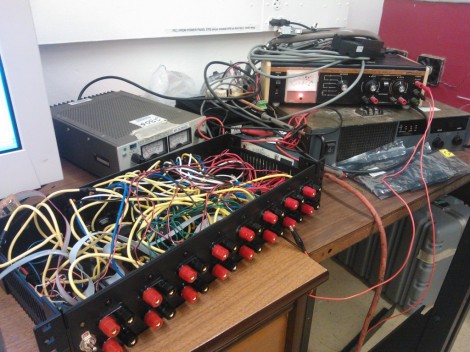
If you’re building solar vehicles at a competitive level you’ve got to know exactly how the storage batteries will perform. To that end [Matthew] built a Lithium Polymer battery tester for use by the McMaster University Solar Car Project. It worked well, but could only test one battery at a time. He just finished up a second version, which can test battery specifications on up to eight units at once. It saves a lot of time, but still takes fifteen hours to test just one set of the units used by the vehicle.
The most important aspect being measured is the discharge curve. Sure, there’s a datasheet that includes this information, but how can be sure that what you received will perform at spec? Each of the eight channels can be disconnected from the system using a relay. This is just one of the safety features which watch for things like over-voltage and over-current conditions. Remember, Lithium batteries can heat up fast if there’s a problem. Data is sampled on a 12-bit ADC and can be pushed to a computer via USB for graphing.















Is that the McMaster car?
(sorry)
The battery tester was built for the McMaster University Solar Car Project that you can check out at http://www.macsolarcar.com
That’s the sound of the joke going over your head.
It’s the delivery vehicle for the hacker’s best resource for all things mechanical.
The battery tester was built for the McMaster Solar Car Project, you can check it out at http://www.macsolarcar.com We are always looking for volunteers/advice/sponsors, give us a shout at macsolarcar@gmail.com if anybody is interested.
Well, I am gonna hazard a guess and say the battery monitoring IC they used was the LTC6803/LTC6802 series from Linear Technology. To be more specific the LTC6803-4 or -2 depending on the battery pack topology. Am I correct or at least close?
It would be nice to see the performance of batteries from different makers / suppliers. Also an idea: you could get some batteries for free or with a discount just for benchmark. I believe, better the battery – easier you’ll get one for free :)
There is a saying, there are Liars, Damn Liars, and Battery Salesmen :-) I think I’d be a bit suspect of a “free” cell for testing; for a real comparison each test cell should be purchased without letting them know you are testing it for evaluation.
That’s exactly what we do argon :), we sample batteries from companies around the world and compare the real life discharge curves. Then when we settle im a final cell manufacturer we test every cell we receive and rank their performances to properly match them in our race pack.
So, what’s the result, do real measurements match up with the given specs, or are the specs wrong?
@kartik, I didn’t use any battery monitor ic in this project, I sample voltage through a multiplexed 12bit adc and I current through 8 hall effect sensors that can handle up to 50 amps continuous. The schmatics further down on my site.
@daid303, the batteries we tested come within 5% of the spec sheet, we test at non standard test conditions as well though (there’s nothing standard about a 3000km race across the Australian outback haha)
Oh ok, thanks for the clarification. Impressive setup…